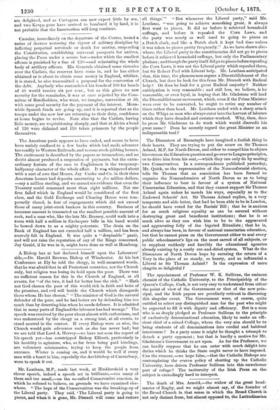Mr. Leathern, M.P., made last week, at Huddersfield a very
clever speech, indeed a speech set in brilliants,—too many of them and too small,—on the so-called Conservative reaction, in which he refused to believe, on grounds we have examined else- where. "The hope of the Conservatives was the breaking-up of the Liberal party. They said, The Liberal party is going to pieces, and when it is gone, Mr. Disraeli will come and restore all things." "But whenever the Liberal party," said Mr. Leathern, "was going to achieve something great, it always first went to pieces. It did so before it achieved household suffrage, and before it repealed the Corn Laws, and the pasty was nearly as well used to going to pieces as a Dutch clock, and like a Dutch clock it kept bad time unless it was taken to pieces pretty frequently." As we have shown else- where, the Liberal party in the constituencies did not go to pieces before it achieved household suffrage, but only the Parliamentary phalanx; and though the party itself did go to pieces before repealing- the Corn Laws, it was not the Liberal party which repealed them,. but Sir Robert Peel with Liberal help. Mr. Leathern anticipated that, this time, the phenomenon argues a Disestablishment of the. Church, but does he look for this from Mr. Disraeli with Radical help ? Or does he look for a great Radical majority? Neither- anticipation is very reasonable ; and still less, we believe, is he reasonable, or even loyal, in hoping that Mr. Gladstone will lead. the Disestablishment movement, which, even if the Prime Minister- were ever to be converted, he ought to retire any number of times rather than head. Mr. Leatham ended with a sharp attack on the Whigs as men who always enter into the harvest of labours. which they have dreaded and counter-worked. Why, then, doea he press Mr. Gladstone to do work which would discredit his. great name? Does he secretly regard the great Minister as an indispensable tool ?


































 Previous page
Previous page